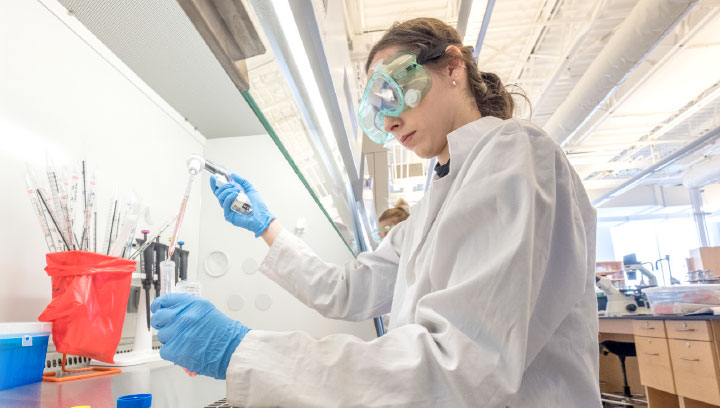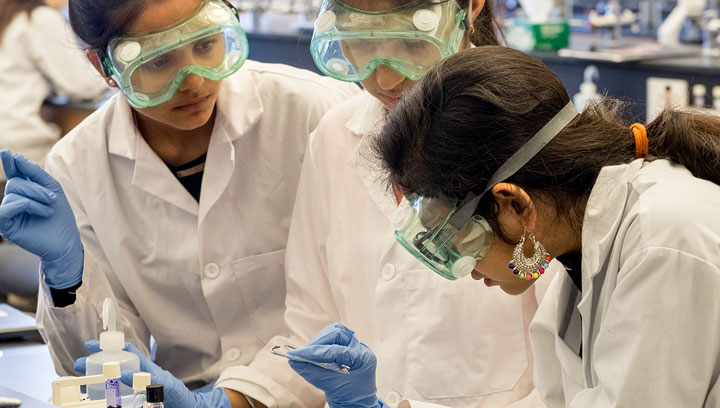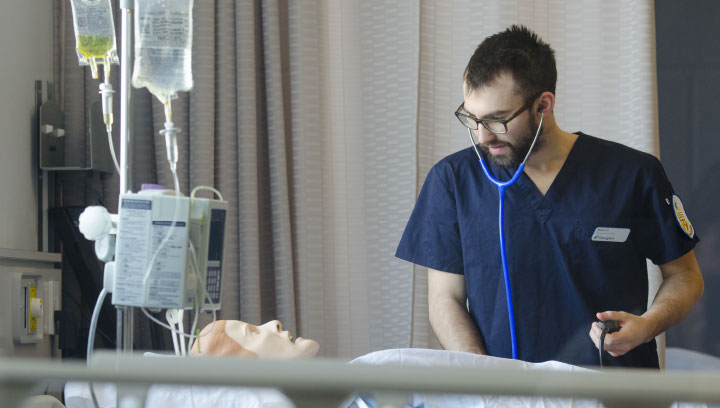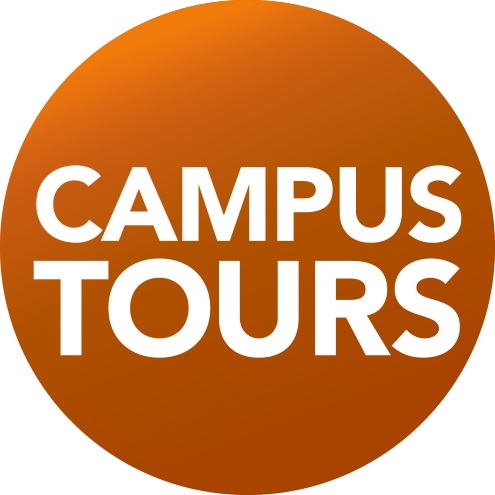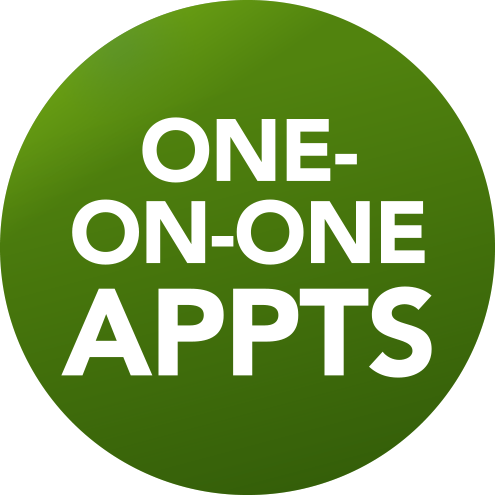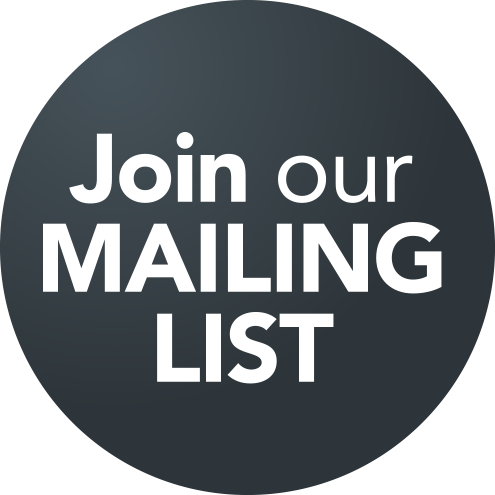
Launch your health-care career as a lab technologist
Medical Laboratory Technology Ontario College Advanced Diploma program
Develop scientific skills in clinical chemistry, microbiology, histology, hematology and transfusion science. Build your knowledge through lectures, labs and clinical activities.
Program information
Program description
The Medical Laboratory Technology program prepares students to become integral members of the health care team as Registered Medical Laboratory Technologists. Through a blend of classroom learning, laboratory activities and clinical placements, students develop the knowledge, technical and critical thinking skills essential to safely and reliably collect and analyze patient samples in a fast-paced clinical environment. Analysis of samples provides timely and critical information to support diagnostic decisions and to evaluate the efficacy of treatment plans.
Students in this high-tech health care program learn to operate sophisticated equipment to measure components of blood and body fluids through course work related to clinical chemistry and clinical hematology. They prepare cultures of collected micro-organisms for identification as part of course work in clinical microbiology, and prepare tissue samples for histological study. Through hands-on practice, students perform blood typing and cross-matching of blood to support blood transfusions within the clinical environment, learn to draw blood safely from patients, and develop other collecting techniques related to the profession.
This program is a great fit for students with keen interests in science, technology and health care, and a passion for solving problems. Students develop the organizational and technical skills to perform their work with efficiency, accuracy and precision in accordance with quality assurance guidelines for the profession.
Intake information
| Start date | Campus |
|---|---|
| Fall 2025 | Barrie |
Tuition and fees
- Visit our tuition and fees page for detailed information on the cost to attend Georgian.
- You can afford this! Explore OSAP as well as awards, scholarships and bursaries to help you pay your way to graduation.
Work-integrated learning
- This program includes a clinical placement component where you’ll get clinical experience under the supervision of an experienced registered or licensed professional.
- Learn about types of work-integrated learning at Georgian.
What are the admission requirements for the Medical Laboratory Technology program?
Medical Laboratory Technology admission requirements
- Ontario Secondary School Diploma (OSSD) or equivalent, or mature student status
- Grade 12 Mathematics (C or U)
- Grade 12 English (C or U)
- Grade 11 or 12 Biology (C or U)
- Grade 12 Chemistry (C or U)
Graduates from the Medical Laboratory Assistant (MLBA) program at Georgian College can apply to the Medical Laboratory Technology (MLBT) program with advanced standing. A minimum grade point average of 65% is recommended.
Admission requirements may be met by completing the Pre-Health Sciences Pathway to Advanced Diplomas and Degrees certificate, or equivalent courses from the Academic Upgrading programs offered by Colleges across Ontario.
Requirements for Advanced Standing to Year 2 of MLBT from practicing Medical Laboratory Assistants or Medical Laboratory Technicians (MLA/T)* are as follows and can be evaluated via the PLAR process:
- Certification from OSMT (Ontario Society of Medical Technologists), MLPAO (Medical Laboratory Professionals Association of Ontario) or CSMLS (Canadian Society of Medical Laboratory Science)
- Three years of experience practicing as a MLA/T
- Letter of reference from Manager highlighting the following:
- Performance as an MLA/T
- Scope of practice being performed
- Readiness to succeed in program
- Current CV or resume
*Applicants should use MLAS as the program code when applying through the Ontario College Application Service (OCAS)
Mature students, non-secondary school applicants (19 years or older), and home school applicants may also be considered for admission. Eligibility may be met by applicants who have taken equivalent courses, upgrading, completed their GED, and equivalency testing. For complete details refer to: www.georgiancollege.ca/admissions/academic-regulations/
Applicants who have taken courses from a recognized and accredited post-secondary institution and/or have relevant life/learning experience may also be considered for admission; refer to the Credit for Prior Learning website for details:
www.georgiancollege.ca/admissions/credit-transfer/
Selection Process
Applicants will be assessed and ranked based on academic grades.
Criminal Reference/Vulnerable Sector Check
Placement agencies require an up-to-date clear criminal reference check and vulnerable sector check prior to going out on placement. Students should obtain their criminal reference three months prior to placement; checks conducted earlier may not be considered current. As some jurisdictions require longer lead-time for processing, please check with the program coordinator to ensure you allow for sufficient turn-around time. It is the student’s responsibility to provide the completed document prior to placement start.
NOTE: Individuals who have been charged or convicted criminally and not pardoned will be prohibited from proceeding to a clinical or work placement.
Additional information
Prior to beginning clinical placements, students must complete the following:
- A mask fit test, renewed every two years;
- Level HCP CPR and Standard First Aid (On-line courses are not acceptable);
- Up-to-date immunization records in compliance with the Public Hospitals Act. Completion and submission of this record is required to ensure your placement in clinical and field placement facilities;
- An up-to-date clear criminal reference check and vulnerable sector screen (renewed regularly so that it is never more than 6 months old).
Placement agencies require an up-to-date clear criminal reference check and vulnerable sector check prior to going out on placement. Students should obtain their criminal reference no more than three months prior to placement; checks conducted earlier may not be considered current. As some jurisdictions require longer lead-time for processing, please check with the program coordinator to ensure you allow for sufficient turn-around time. It is the student’s responsibility to provide the completed document prior to placement start.
NOTE: Individuals who have been charged or convicted criminally and not pardoned will be prohibited from proceeding to a clinical or work placement.
Applicants are encouraged to obtain volunteer or work experience in a health or human service field to assist them in making a career choice.
In order to provide quality practicum placements, students are placed in a variety of agencies in the region serviced by the campus. Students are required to provide their own transportation to practicum placements. Placements may be 6, 8, 10- or 12-hour days and may include holidays, weekends, nights and evenings starting as early as 0600.
Information about placement requirements
To help you navigate the requirements to complete the clinical placement component(s) of this program (e.g. immunization, First Aid and CPR, criminal record screening and other non-academic requirements), please review the details below.
For more information about placements, visit the Placement Offices webpage.
In order to provide quality practicum placements (“Placements”), students are placed in a variety of agencies, largely in the region serviced by the campus. Students are required to provide their own transportation to Placements. Placements may vary in length (e.g. six to 12 hour days) and may include weekends and evenings, with varying start and end times (e.g. day, afternoon, overnight).
Many programs, including Health and Wellness, have immunization, First Aid and CPR, criminal record screening and other non-academic requirements that need to be met prior to Placements starting. You are responsible for carefully reviewing and meeting these requirements. The failure to meet them may mean that the host agency may refuse to accept you for a Placement or, if you have started one, that you may be prevented from continuing. The result may be that you cannot complete your program. Program-specific requirements can be found on page 2 of the Clinical Preparedness Permit specific to your program.
You are responsible for meeting all immunization, criminal screening and other requirements by the deadline provided by your program and before you start your Placement.
Notes regarding the Criminal Record Check (“CRC”) and Vulnerable Sector Screening (VSS)
Individuals who have been charged or convicted criminally and not yet pardoned or who have adverse entries on their CRC or VSS will be prohibited from proceeding to a Placement. Such a student will normally be counselled to withdraw from the program because the successful completion of a Placement is a program requirement.
Obtaining the CRC and VSS usually requires a processing time of up to 12 weeks and can vary between police jurisdictions. As some jurisdictions require longer lead time for processing, ensure you allow for sufficient turn-around time. Record checks and screenings conducted earlier than six months may not be considered current and not be acceptable. Refer to your Clinical Preparedness Permit for information regarding this. A host agency may refuse a Placement if the CRC or VSS is not satisfactory to it. It is the student’s responsibility to provide the necessary completed documents prior to the start of a Placement at the designated check time, and in the format set by Georgian College and stated in the Clinical Preparedness Permit Information Package. More information can be found on the Placement Offices webpage.
The costs associated with the provision of the CRC and VSS, anything related to them (including, if applicable, obtaining a pardon), and meeting any immunization and other Placement requirements, are to be borne by the student. The non-academic requirements of clinical agencies as described in the Clinical Preparedness Permit are subject to change at any time and host agencies may accept or decline students for any reason at their discretion. Georgian College is not responsible for any of the costs associated with the foregoing, nor for the consequences of failing to comply with, any of the requirements set out above.
What career paths can I take in medical laboratory services?
Your Medical Laboratory Technology diploma gives you many career opportunities
Graduates of this program may find employment in a variety of settings and roles, including the following:
- medical laboratory technologist in hospitals, private and public medical laboratories
- sales and service of equipment used in medical laboratories
- quality control technicians in a variety of industries
- research assistants, lab technicians in research environments, pharmaceutical companies
- public health consultancy
Accreditation
Accreditation Canada
The Medical Laboratory Technology Advanced Diploma at Georgian College has been awarded Registered status through EQual Accreditation, a branch of Accreditation Canada – Healthcare Accreditation Body. Georgian’s program is present on the list of educational programs on the Accreditation Canada website.
Accreditation Canada sets the educational and accreditation standards for health education programs across Canada. Registration status indicates that Georgian’s program has begun the formal accreditation process to meet the quality and educational standards set out for Medical Laboratory Assistant programs.
“Registered” status is the first step of becoming an accredited Medical Laboratory Technology program. At this time, we are preparing the documents necessary to reach “Accredited with Conditions” status and anticipate reaching this status by the time students are ready to graduate from the program.
National Certification Exams
Graduates of this program will be eligible to write the National Registration Exam through Canadian Society for Medical Laboratory Science (CSMLS) and can begin their career as a registered Medical Laboratory Technologist.
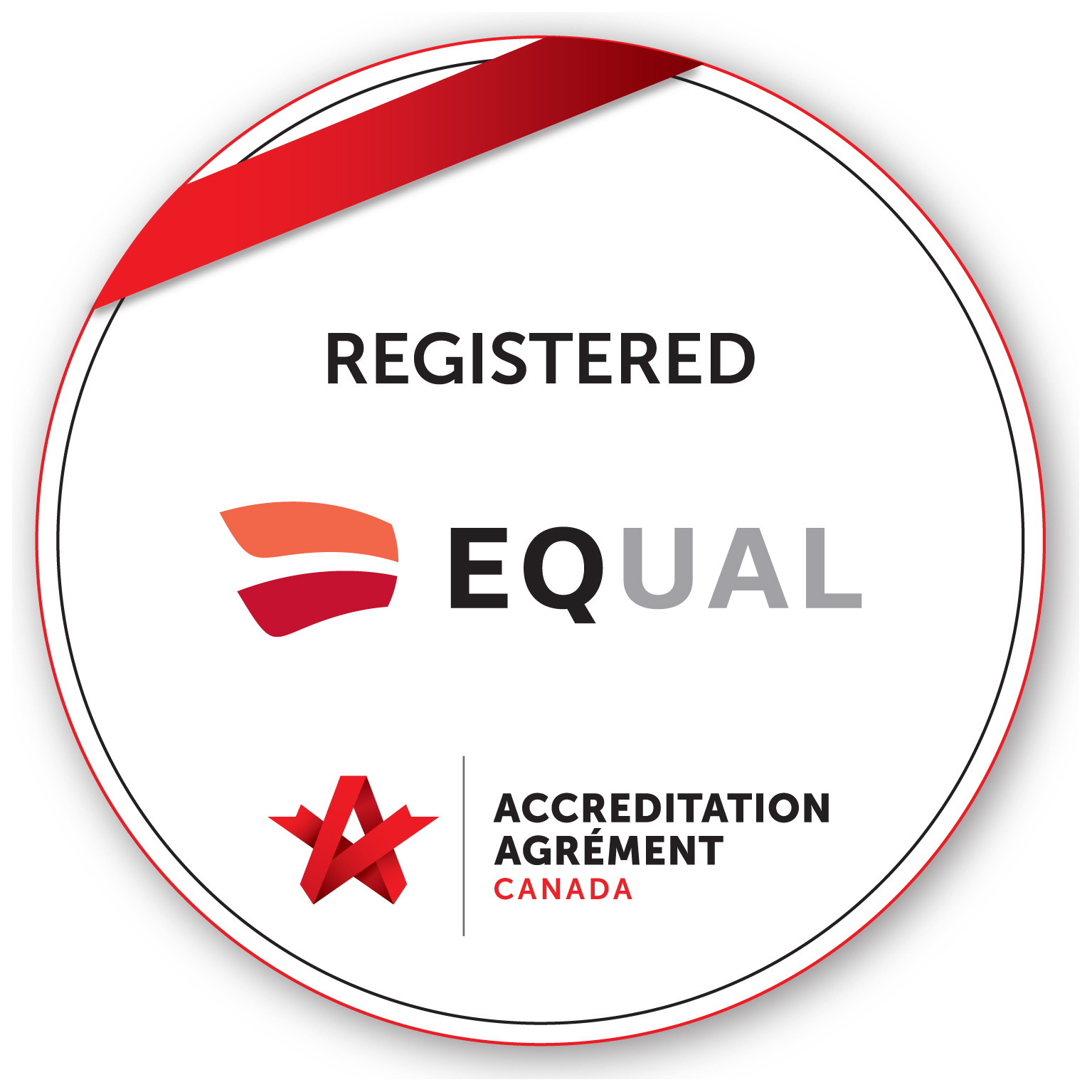
What courses are included in the Medical Laboratory Technology diploma program?
Course overview
33 Program Courses
2 Clinical Placements
2 Communications Courses
3 General Education Courses
Program-specific courses
Semester 1 courses are listed below. For a full list of courses in the program including course descriptions, view the Medical Laboratory Technology program outline.
- BIOL 1044 – Anatomy, Physiology and Medical Terminology
- BIOL 1045 – Molecular Techniques
- MATH 1045 – Medical Laboratory Mathematics
- MLAB 1000 – Quality Assurance and Control
- MLAB 1001 – Lab Equipment and Safety
- Select 1 course from the communications list during registration.
- Select 1 course from the general education list during registration.
Your course delivery method(s)
In person
This program is delivered fully in person and requires you to attend campus.
Please note, delivery methods are based on planning for the upcoming semester and are subject to change.
Check out our other related programs
Medical Laboratory Assistant
Explore pre-examination laboratory techniques in state-of-the-art laboratories. Play a vital role in the promotion of wellness and detection of disease.
Biotechnology – Health
Explore this high-tech trade as you become proficient with techniques in molecular biology, cell biology, chemistry and physiology.
Pre-health Sciences Pathway to Advanced Diplomas and Degrees
Your first step toward further studies in health programs. Develop your employability skills. Be on your way to a career in health care!
Practical Nursing
Caring, committed faculty. More clinical time to build your skills. State-of-the-art facilities. Our students excel on provincial exams!
Do you have questions about Medical Laboratory Technology? Contact us!
Thinking about applying to Georgian?
Contact our student recruitment team to explore your study options.
Already applied to Georgian?
Connect with the Office of the Registrar for admissions-related questions.
Are you an international student?
Contact our international recruitment team to learn more about studying at Georgian.
Ways to connect
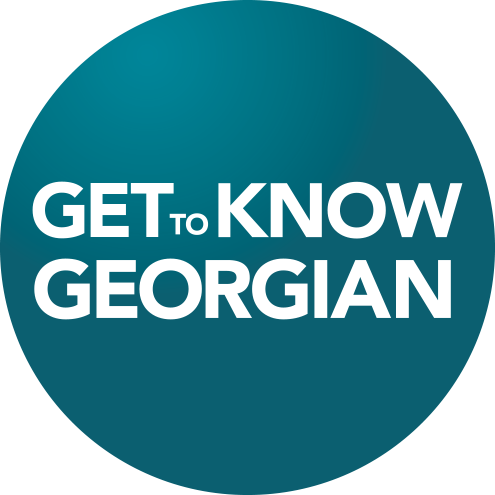
Attend a Get to Know Georgian
virtual info. session on February 11 or March 18.
Register for an upcoming session
Take a guided, in-person tour
of our campuses.
Book a campus tour.
Book a phone appointment
with a recruitment specialist.
Connect with a recruiter.
Join our email list for event updates, contest information and more.
Sign up for Georgian updates.

